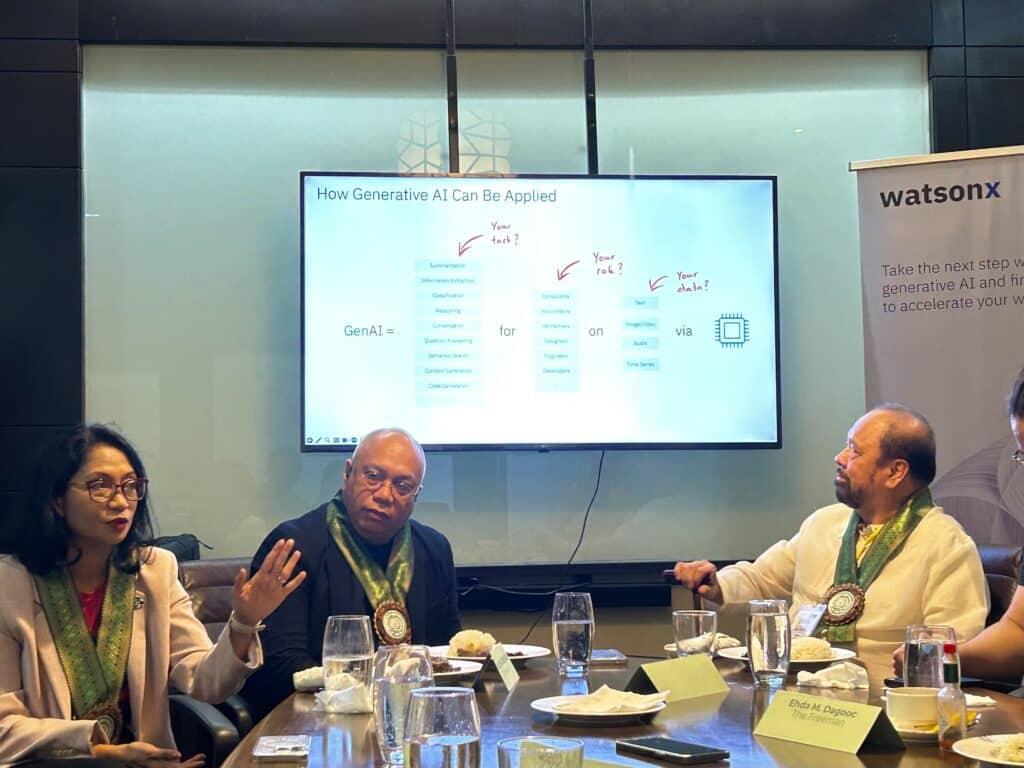AI+, not +AI: The formula for reinventing work with AI

Aileen Judan-Jiao, President and Technology Leader of IBM Philippines, along with officials from the Philippine Institute of Industrial Engineers (PIIE), spoke in a roundtable discussion on Artificial Intelligence (AI) in Action on November 15, 2024. | CDN Digital Photo/ Pia Piquero
CEBU CITY, Philippines – Artificial intelligence (AI) is no longer a futuristic idea confined to the pages of science fiction. It is here, now, redefining industries, reimagining job roles, and revolutionizing how we work.
Just as mathematics relies on formulas to solve complex problems, industries today are discovering a new formula for success: AI+
This concept, as explained, goes beyond merely adding artificial intelligence to existing workflows. Instead, it positions artificial intelligence as the central driving force behind innovation and transformation across various business sectors.
But what does this shift truly mean? Is AI poised to replace human workers, or is it the key to unlocking new opportunities?
‘AI is never a substitute for critical thinking’
In a recent roundtable discussion on November 15, thought leaders from various industries came together to explore how AI+ is reshaping the workplace, fostering growth, and empowering employees to thrive in an increasingly AI-driven world.
“AI is not here to replace people…it’s here to empower us,” said Aileen Judan-Jiao, president and technology leader of IBM Philippines.
AI in Journalism: How AI can augment journos’ jobs
Survey: Filipino firms invest in AI, yet many struggle to harness its power
Philippines among top 5 countries for ChatGPT usage, report shows
Jiao explained that while AI excels at handling tasks with greater speed and efficiency, its true potential lies in its ability to augment human intelligence.
She said that when AI is applied in an open, trusted, targeted, and empowering way, it becomes a transformative tool for growth and efficiency.
However, Jiao warned that neglecting to adopt AI responsibly could result in it replacing human roles. She said that with the rapid advancement of AI, inaction is no longer a viable option.
“If you don’t do it that way, then yes, it will replace people. What else? If you do nothing, yes, maybe, because the pace of artificial intelligence is really fast. It’s not only in the Philippines; it’s across the region. It is global,” Jiao said.
Jiao said a paradigm shift is crucial across industries and businesses, urging them to move beyond viewing AI as merely an add-on to enhance existing systems.
She encouraged placing AI at the center of operations, allowing companies to fully utilize technologies like automation, predictive analytics, and visual inspections to create artificial intelligence-driven solutions that bring transformative change.
“If we all don’t level up…we can all get left behind,” she said.
Moreover, the discussion also highlighted Cebu as a growing hub for AI innovation, particularly in the manufacturing sector.
Jiao said that Cebu’s manufacturing industry is the second-fastest-growing in the country and has become a focal point for demonstrating AI applications.
She cited examples such as predictive maintenance and visual inspection, which are already being implemented by local companies like Knowles, a global leader in audio manufacturing based in Mactan.
Despite the promise, integrating AI comes with challenges. The primary hurdle, as identified by Philippine Institute of Industrial Engineers (PIIE) representatives, is changing mindsets.
Engineer Rodel Adiviso said that skepticism, fueled by fears of job displacement, often hinders artificial intelligence adoption. However, he added that these fears can be alleviated through education and demonstration.
“AI is not about displacement; it’s about augmentation…Think of how computers transformed the way we work. They didn’t replace us—they made us more efficient and gave us flexibility. AI will do the same, provided we upskill and align processes effectively,” he explained.
READ:
Smarter Philippine cities with artificial intelligence?
Infrastructure limitations, such as the need for high-speed internet and robust data centers, were also noted as obstacles. However, Adiviso said with Cebu’s strategic positioning as an innovation hub, these challenges present opportunities for growth.
“AI can be perceived negatively in some areas, but it has a lot of positive potential if used properly,” he said.
“It should be seen as a tool to enhance our well-being rather than as something that may displace jobs. Furthermore, there are numerous opportunities to upskill people,” Adiviso added.
While education is key to fostering AI adoption, the PIIE has partnered with universities and colleges to introduce students to the practical applications of AI, such as optimizing supply chain management and implementing predictive maintenance.
It also offers outreach programs and innovation competitions aimed at preparing the next generation for an artificial intelligence-driven future.
Disclaimer: The comments uploaded on this site do not necessarily represent or reflect the views of management and owner of Cebudailynews. We reserve the right to exclude comments that we deem to be inconsistent with our editorial standards.
